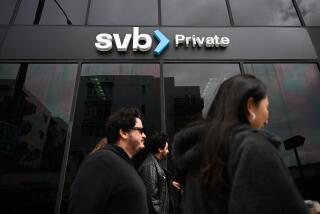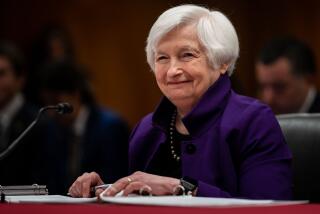California may join probe of Wall Street’s role in mortgage meltdown
- Share via
Reporting from New York and Los Angeles — California is considering joining New York and Delaware in a wide-ranging investigation into Wall Street’s role in the mortgage meltdown that could lead to criminal charges against financial executives.
California Atty. Gen. Kamala Harris met with New York Atty. Gen. Eric Schneiderman on Thursday in San Francisco to discuss cooperating on the investigation, which is already one of the broadest to probe how banks encouraged the financial crisis through the creation of risky financial instruments backed by mortgages.
New York and Delaware have more than a dozen attorneys working full time on the effort and have subpoenaed or requested information from 13 financial firms, including Goldman Sachs and JPMorgan Chase & Co., according to people familiar with the investigation. The people spoke on condition of anonymity because of the sensitivity of the investigation.
Schneiderman declined to comment on any specific investigation but told The Times, “We’re taking a hard look because the American people are entitled to a full investigation that uncovers all the facts and holds those responsible to account.”
Delaware Atty. Gen. Beau Biden declined to comment on the investigation.
California would represent a vital addition to the investigation because it was the location of a vast number of the mortgages and foreclosures that fed into the crisis. Since home prices peaked in 2007, California homeowners have lost $1.9 trillion in home equity, according to an estimate by the research firm Moody’s Economy.com.
Harris told The Times: “California was disproportionately harmed by the mortgage crisis, and our homeowners badly need relief. We will critically evaluate every possible avenue of relief for Californians. If it will result in real accountability and real results, no option will be off the table.”
The public has clamored for the scalps of financial executives who encouraged the real estate bubble, but most investigations so far have focused either on mortgage fraud by low-level brokers and appraisers or on the handling of foreclosures by banks and other lenders.
Prosecutors have had much more trouble pinning blame on executives at marquee firms such as Countrywide Financial founder Angelo Mozilo. The Justice Department shelved a criminal probe into Mozilo’s activities. In end, federal regulators became involved, and Mozilo had to pay $22.5 million to settle their claims that he downplayed the risks of subprime mortgages.
The lawyers in the attorney general offices in New York and Delaware are looking at the role that Wall Street played in the buildup to the crisis: allegedly inflating the demand for subprime loans and then packaging them into shoddy bonds that triggered the financial meltdown, people familiar with the matter said.
“This is where all the bodies are buried,” said Charles Geisst, a former banker who now teaches at Manhattan College. “This is where you could see fraud on an institutional level.”
Biden and Schneiderman have separate but parallel investigations into the matter and have signed an agreement to share information, people familiar with the cases said.
Schneiderman’s office is particularly feared by bankers because the state has unusually broad laws that have allowed past holders of the office, including Eliot Spitzer, to pursue cases that slipped through the fingers of federal prosecutors.
“It’s a different ballgame when you are dealing with the New York A.G.,” said Brad Bondi, a securities lawyer at Cadwalader, Wickersham & Taft.
One of the strengths of New York law is that, unlike under federal law, prosecutors can build a case without proving that fraud was intentional. Even with this easier standard, Douglas Elliott, a former banker who is now with the Brookings Institution, said Schneiderman and Biden will have a hard time securing the convictions for which the public has hungered.
“Investigations like these are very difficult because they often hinge on intent,” Elliott said. “It’s extremely hard to judge intent unless there’s a smoking-gun email or something like that.”
A special congressional commission and a Senate committee have both done industrywide probes of Wall Street and pointed to wrongdoing in the mortgage operations of banks, but neither had prosecutorial abilities. They did pass on their findings to federal prosecutors, but so far the Department of Justice has not announced any broad investigations of how banks stoked the mortgage meltdown.
This throws even more attention on the probes being conducted by the two states, which is being hailed by advocates of homeowners and critics of the banks.
“It’s long past time,” said John Taylor, the head of the National Community Reinvestment Coalition. “One key to getting our economy back on track is to make sure we have safe-and-sound lending practices.… But more helpful than enacting those is enforcing the laws that are on the books now.”
People close to the investigations said the lawyers are looking at whether the banks misled investors about the risks of the bonds and whether they even had proper title to the underlying mortgages they were selling.
The moves by Schneiderman and Biden go significantly further than a current effort by all 50 state attorneys general to take banks to task for their work in servicing foreclosures, which became an issue only after the financial crisis began.
That nationwide effort was expected to have produced a big settlement by now — for more than $20 billion — but negotiations have been slow, and the outlines of the deal have been criticized by consumer advocates and former regulators for letting banks off too lightly.
One of the sticking points in the negotiations is a request from the banks for immunity from further investigations, such as those being conducted by New York and Delaware.
In a call with analysts Thursday, JPMorgan Chief Executive Jamie Dimon said his bank wants to come to an agreement but doesn’t want to be open to further prosecution.
“We’re not going to do it and be subject to double and triple jeopardy,” Dimon said.
Schneiderman and Biden are still involved in the national settlement negotiations, but Schneiderman has said he is concerned that the other attorneys general will grant the banks immunity.
Harris is weighing whether she would sign on to the settlement if it gave banks immunity, a person familiar with her thinking said.
How large the pot of money going to California homeowners is the biggest consideration in any deal, that person said.
In May, Harris announced the creation of a 25-person task force to look at mortgage fraud, but she recently said that effort could be thrown into limbo by state budget cuts imposed this month.
“The budget cuts were a real challenge, are a real challenge, but the attorney general is literally working every hour, is literally working right now to mitigate those,” said Michael Troncoso, senior counsel to Harris.
Schneiderman’s office has requested documents from seven investment banks that sold mortgage-backed bonds to investors; two banks that held the mortgages while they were turned into bonds; four companies that insured the bonds; and two law firms that helped negotiate the process, according to people close to the investigation.
Delaware has separately subpoenaed MERS, the company that was responsible for registering the mortgages before they were turned into bonds, the people said.
None of the firms would comment on the investigation.
More to Read
Inside the business of entertainment
The Wide Shot brings you news, analysis and insights on everything from streaming wars to production — and what it all means for the future.
You may occasionally receive promotional content from the Los Angeles Times.









